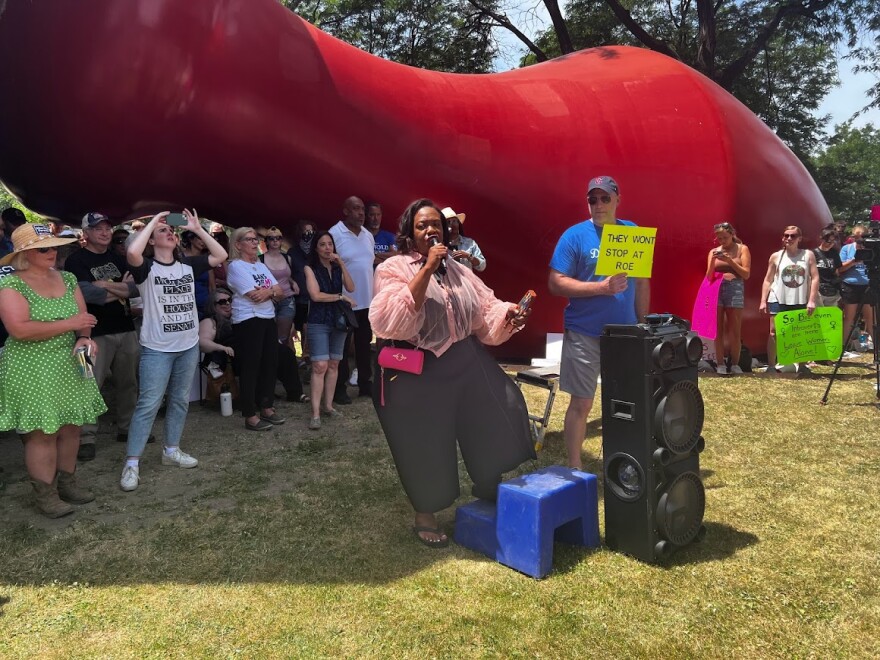The day after the U.S. Supreme Court overturned Roe v. Wade, a group of protestors gathered in Downtown Cleveland in the shadow of the Free Stamp to protest limits on abortion.

Although the crowd of protestors surrounding the oversized red art installation located in Willard Park area near the intersection of East 9th Street and Lakeside Avenue was mostly white, they were protesting in support of a procedure that is disproportionately accessed by Black women.
Black people make up just 13% of Ohio’s population, but Black pregnant people make up nearly half of abortions performed in the state, figures from the U.S. Census and the Ohio Department of Health show. That also means that limits on the procedure disproportionately affect Black women.
For nearly 50 years, the U.S. Supreme Court decision known as Roe v. Wade protected access to abortion nationwide. The court overturned Roe Friday, eliminating the constitutional right to abortion and allowing states to legislate the procedure. About half of states have moved to reinforce abortion rights, while others have restricted access, creating a patchwork of policies across the country.
In Ohio, the procedure is now mostly banned. After Roe’s reversal, Ohio’s ban on abortions after a fetal heartbeat is detected went into effect.
Those abortion limits are dangerous for Black women, said Juanita Brent, the vice-chair of the Cuyahoga County Democratic Party. She is Black, and she believes banning the procedure is rooted in racism. Black women are three times as likely to die from pregnancy-related causes as white women, according to the Centers for Disease Control and Prevention.
“Why are we forcing people to continue on with pregnancies? It doesn’t make any sense,” she said. “It’s like you’re trying to target Black women to kill them.”

A study published by Duke University Press found that with less abortion access, there will likely be a disproportionate increase in deaths of Black women in childbirth.
Dr. Amma Boakye, a resident physician at MetroHealth, said the Supreme Court decision will worsen racial health disparities.
“Black maternal mortality is already so high,” she said. After repeal, there’s “no backup plan on how are we going to bolster support in other places to make sure people can raise their children and make sure they have access to heath care and schools and education and food. It will just worsen health care disparities for Black women and then their children, their children’s children.”

But some anti-abortion activists think banning abortion will be a good thing for Black women. Walter Moss, a pastor in the Canton area and a member of the National Black Pro-Life Coalition, says abortion clinics target the Black community.
“We don’t find them in the white communities like they are in the African American communities,” he said.
The Guttmacher Institute, a nonprofit that tracks abortion access and legislation, disputes this claim, which has been shared widely in anti-abortion circles. According to their analysis, fewer that one in 10 abortion clinics are located in neighborhoods where more than half of the residents are Black.
But Moss said he believes abortions are Black genocide.
“It lowers our population, our numbers,” he said.
Kate Makra from Cleveland Right to Life said she thinks abortion clinics exploit people of color.
“I believe that they are brainwashed into believing that they don’t have any other options,” she said.
Makra said she would like to see more sex education to improve understanding of family planning.
“We need to work on educating our young people to make smarter choices so they wouldn’t have to be faced with an unplanned pregnancy,” she said.
She also wants to see more education to make women and babies healthier.
But some of the risks for Black women are beyond their control. Pregnant Black women die at a rate that’s three times as high as white women, regardless of education and income level, according to the American Journal of Managed Care.
Although women with higher education levels do have lower maternal mortality rates, Black women who graduated from college have a higher risk of preterm birth than white women who dropped out of high school, according to research cited by the American Journal of Managed Care.
Health experts aren’t sure exactly why maternal and infant mortality rates are so high in the Black community, but issues of systemic racism—housing, education and economic disparities—could all play a role in higher mortality rates for Black women and their babies, according to the CDC.
Makra dismissed those concerns.
“I don’t know where you’re getting that statistic about dying in childbirth because statistically, women hardly ever die in childbirth,” she said.
In 2019, there were 87.7 deaths per 100,000 live births in Ohio, according to figures from the Ohio Department of Health. The U.S. has the worst maternal mortality rate out of 11 developed countries, according to a report from the Commonwealth Fund.
Makra also said she didn’t believe there is a racial health disparity in maternal and infant mortality rates. Black babies die at a rate that’s three times higher than white babies, according to data from the CDC.
Copyright 2022 WKSU. To see more, visit WKSU. 9(MDA5NTM4MTIyMDE0MTg3NDc2MTVlZjdmNQ001))


